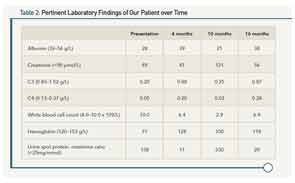Back to the Case
Pediatric rheumatologists recognize that in order to achieve adequate disease control and autonomy, the adolescent with cSLE requires self-management skills, education, motivation, and engagement. Understanding adolescents’ relationships with their peers and parents, as well as their educational and extra-curricular involvement is crucial for successful disease management. The disease course outlined here is not infrequent, and requires a multidisciplinary team approach to promote adherence, to place the disease in the larger context of life, and to provide solutions to significant issues such as acne and depression. We are fortunate to have developed a successful multidisciplinary cSLE clinic, whereby all adolescents are regularly seen and reviewed by rheumatologists and nephrologists, members of the adolescent health team (physicians and nurse practitioners), and as required by psychiatrists, social workers, and nutritionists. When necessary, patients can access other specialists from dermatology, ophthalmology, and other fields. By combining multiple services and appointments into one day, adolescents are more likely to receive the care they require. Our transition program brings the adult rheumatologist to meet the transitioning adolescent at the pediatric hospital during their last appointment, with the completion of a health passport and wallet card with pertinent personalized disease information.
The next step in self-management is completion of a mobile app, which my colleagues and I have developed through consensus methodology and is currently being evaluated by a demographically diverse group of adolescents with cSLE at two sites (Toronto and Charleston, S.C.). The app aims to fulfill an unmet need, which is the ability to carry secure, personalized health information that can be made readily available in an emergency. It allows the user to set alarms and personalized reminders for medications and appointments; to log symptoms using text, menus, and diagrams; and integrate photos taken by the patient. Didactic information about SLE is available as are links to useful websites and videos. A portal to a secure social networking site for app users is being developed.
As is frequently the case in pediatric chronic disease, we do not know a great deal about the long-term outcomes of our patients. In general, patients with cSLE are transitioned to adult care between the ages of 18 and 21. Self-management of a chronic disease in young adulthood ranges from poor to excellent, and plays a big role in their ultimate health. The risks of adverse cardiovascular events are very high in young women with aSLE, and we can only assume at this point that disease onset in childhood leads to an even greater long-term risk due to multiple factors, in particular, the chronic inflammatory state.



